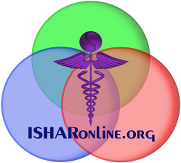Meditation > Medical
List ISHAR Online Sources: Meditation > Medical
Functional Summary
|
Modality |
|
Training of the mind to achieve greater control and focus. |
|
Intention |
|
Includes a variety of techniques for the purposes of relaxation, buildup of life force, concentration, and the development of positive emotional traits. |
|
Geo-Cultural |
|
Meditation shows up in some form or another in a myriad of cultures throughout the world. |
Topic Summary
Because it is practiced in so many different cultures, meditation has a variety of origins. However, the earliest references to meditation have come from ancient Vedic texts. Additional forms of meditation arrived in the 6th and 5th centuries BCE in China and India. Meditation practices can also be found within the Islamic and Christian religious traditions.
While the goals of meditation are often mentally oriented, it has been found to have a number of health benefits. Perhaps because of its relaxing nature, meditation may help to prevent or treat a number of health issues. First and foremost among these is high blood pressure. Cardiologist Dr. Herbert Benson believes conditions caused or worsened by stress can be alleviated via meditation. This is true because meditation increases activity in brain areas that control metabolism and heart rate. It may also help reduce the risk of heart disease and stroke.
It has also been suggested that meditation may help decrease the severity of irritable bowel syndrome symptoms. Similarly, meditations stress reduction capabilities have the potential to help people with ulcerative colitis by reducing the rates of flare-ups from stress.
Several studies have looked at meditations effect on the immune system. Research found that the relaxation promoted by meditation boosted immunity in recovering cancer patients. Another study found meditation brought about higher resistance to influenza. It could also potentially give older people greater resistance to tumors and viruses.
Finally, several research groups have found that meditation may help relieve the symptoms of premenstrual syndrome and menopausal symptoms, as well as increase fertility.
Research Summary
An extensive amount of quality research has been conducted on the health benefits of meditation, the majority of which seems to have been conducted in the past 5-10 years. One such study from 2015 considered how breast cancer survivors had very limited options for treatment of menopausal symptoms, and concluded that yoga and meditation combined provided safe and effective complementary intervention, with effects lasting at least 3 months.
Additionally, a 2014 review of clinical evidence on meditations use as treatment of coronary heart disease concluded studies demonstrated that meditation was, in fact, a beneficial treatment of various cardiovascular risk factors, in addition to improving hypertension, type 2 diabetes, and other health issues. The study does point out, however, that it has not been made clear how effective meditation alone is compared to current medical therapies for the treatment of coronary heart disease.
A study published in 2012 found that training in meditation or exercise could be effective at reducing incidence, duration, and severity of acute respiratory infection illness.
Perspectives
ISHAR strives to present all of our data in an impartial, informative manner. Nonetheless, there are always different viewpoints on various topics, and ISHAR encourages users to review the perspectives on other informational sites, then come to their own conclusions regarding what they consider the least biased. The sites below were chosen to represent a wide spectrum of approaches to this topic, and none are endorsed or promoted by ISHAR itself.
- Wikipedia: http://en.wikipedia.org/wiki/Meditation#Health_research
- WebMD:http://www.webmd.com/mental-health/features/meditation-heals-body-and-mind
- A Pro-Practice Website:http://liveanddare.com/benefits-of-meditation/
- An Anti-Practice Website:http://www.lorinroche.com/dangers/homeless.html
